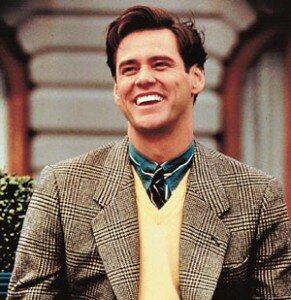 An innocent abroad in a less-than-innocent world is a standard story template. It has been used over and over. Decades ago I read Robert Heinlein’s A Stranger in a Strange Land. That was one take on the innocent story. Kurt Vonnegut’s Slaughterhouse-Five, with his main character of Billy Pilgrim, was another.
An innocent abroad in a less-than-innocent world is a standard story template. It has been used over and over. Decades ago I read Robert Heinlein’s A Stranger in a Strange Land. That was one take on the innocent story. Kurt Vonnegut’s Slaughterhouse-Five, with his main character of Billy Pilgrim, was another.
It shows up in movies frequently as well, such as The Truman Show. When it is used, it is often with a satirical purpose. Through the innocent’s eyes, we see how the world really is (or how the author or filmmaker thinks it really is). It’s usually comic, at least to some degree.
But the satire isn’t just intended to illustrate what is wrong with the world. It is also to illustrate what could be right and how we’ve gone off track from pursuing it.
That is really what is at the heart of The Truman Show. It isn’t about the misguided nature of television and its audiences, though it is that in part. And it’s not simply about the hazards of over-the-top commercialism, though it’s about that too.
The story of the innocent is really about what the point of our lives is and what we could be doing with them.
Truman’s story is about a man who wants more. Not more “stuff,” but more meaning. Yes, his life is comfortable. But for Truman, that’s not enough. He wants to know, “What else is out there?”
The Truman Show (1998)
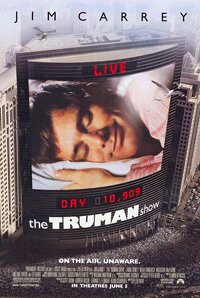 directed by Peter Weir
directed by Peter Weir
“You never had a camera in my head.”
Those words, I think, capture the essence of The Truman Show best. There’s much in the world that can be controlled, but controlling what someone thinks and, maybe more importantly, feels is not so easy.
For me, this is one of the best movies of the 1990’s, and one of my favourite movies, period. Now, with the recent release of it in a special edition, I have the DVD I had been wanting – better image, informative features. (Note: this review was written in 2005 and refers to the Special Collector’s Edition DVD.)
Slightly preceding the current glut of reality TV shows, the film’s concept seems simple enough, though perhaps less clever now than when it first appeared, before our reality TV world.
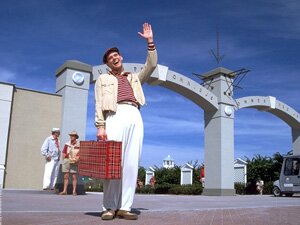 While the concept may seem simple – a movie about a guy whose entire life is broadcast live on television – imagine how you would execute that and make it interesting. It comes across more like a clever notion on paper, but the kind of thing that could lead you into a cinematic fiasco.
While the concept may seem simple – a movie about a guy whose entire life is broadcast live on television – imagine how you would execute that and make it interesting. It comes across more like a clever notion on paper, but the kind of thing that could lead you into a cinematic fiasco.
But between Andrew Niccols’ script, Peter Weir’s direction and some great casting, it works brilliantly.
Jim Carrey is Truman Burbank. His life , from birth, has been broadcast live to the world (unbeknownst to him). He lives in a town called Seahaven – always has, he’s never left – but what he doesn’t know is Seahaven is a television set in California, not a town on the Florida coast. He lives in a not-quite-perfectly controlled world.
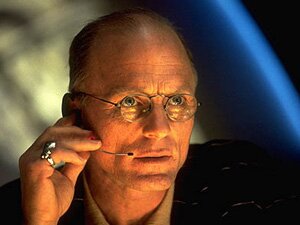 “We accept the reality of the world with which we are presented,” says Christoff (Ed Harris), the show’s creator and mastermind.
“We accept the reality of the world with which we are presented,” says Christoff (Ed Harris), the show’s creator and mastermind.
But as much as Christoff controls Truman’s world, he can’t control everything – including Truman.
There are small errors in Truman’s world and they might go unnoticed by him except the life scripted for him is not the one he would live. The more the show’s creator, actors and crew try to steer Truman and keep him on script, the more he resists.
And so Truman embarks on discovering his world, though that’s not his initial motivation.
As mentioned in the special features, Peter Weir made one change to the script that was bang on the money. Originally set in New York, and a darker film, Weir understood that for people to watch such a show (not the movie, but in the script’s world, The Truman Show), it would need to be lighter, more comforting.
So the movie is set in Seahaven, a somewhat heightened reality. It’s roots are more in the world of 1950’s television than the real world, though not to such an extent that it lacks credibility.
Another great notion in the film’s making was the casting of Carrey. He is perfect as Truman. Charismatic and affable, he brings the right amount of innocence to the role of Truman. It might not have worked in another movie, but in the world of The Truman Show it hits the mark.
I also like that there are several ways of seeing The Truman Show. There is the obvious satire on television culture and the issue of personal freedom.
(I like the irony of Christoff “a very private man” being the architect of a very public life – Truman’s.)
Another way of seeing the film, however, is as a fable of a child leaving home.
Christoff is an obvious father figure and Truman is clearly a young man trying his damnedest to leave and find his own life – but not the one Christoff dreams for him (rather like a parent trying to impose his vision on his child.)
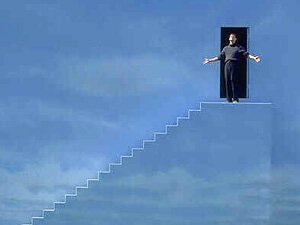 In fact, however you view the film, it’s essentially a fable. Perhaps this is why I like the movie so much – I’ve a weakness for these types of films when they are well done.
In fact, however you view the film, it’s essentially a fable. Perhaps this is why I like the movie so much – I’ve a weakness for these types of films when they are well done.
Weakness or not, I consider this one of the best films of the last decade or so. It’s also one I think will continue to be watched over the years as it captures, quite succinctly and in an engaging fashion, something in the nature of freedom that is deeply woven into the human fabric. The film’s ending captures an archetypal, mythic moment and it’s one that resonates. I can’t recommend this one highly enough.
The Truman Show (the trailer)
Links:
- The Truman Show – DVD, HD, etc. on Amazon.com (U.S.)
- The Truman Show – DVD, HD, etc. on Amazon.ca (Canada)


